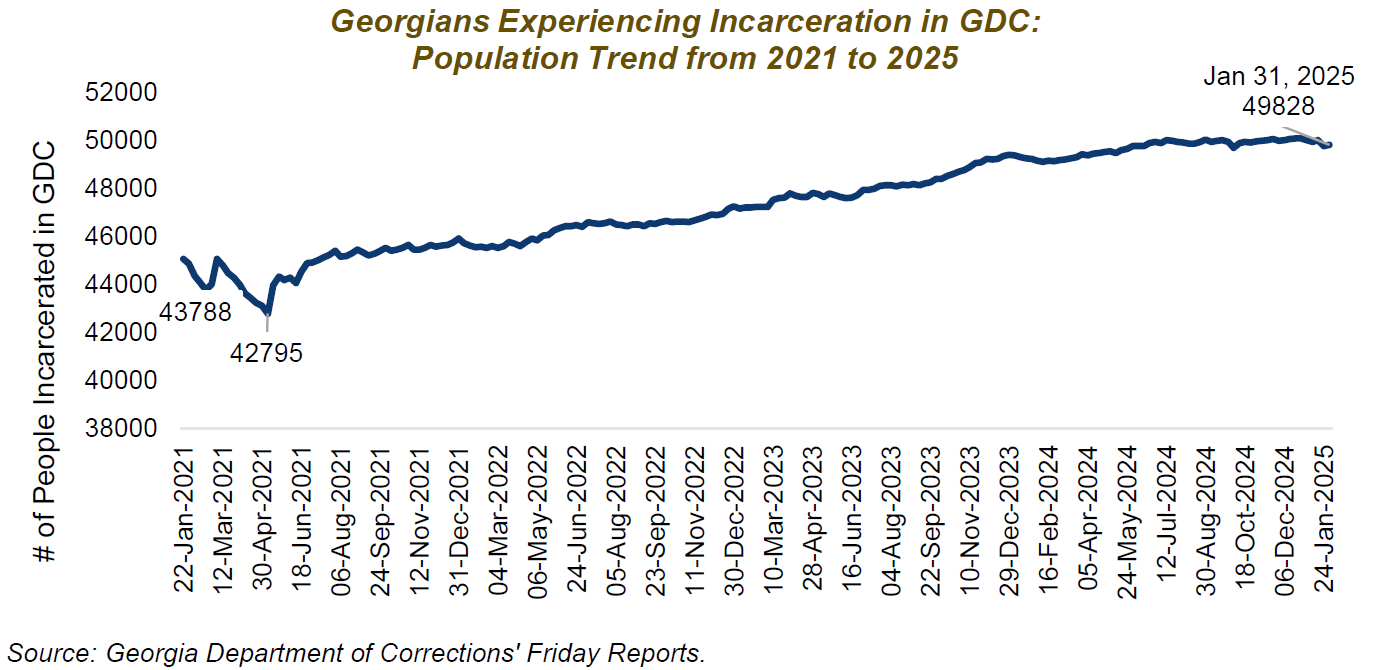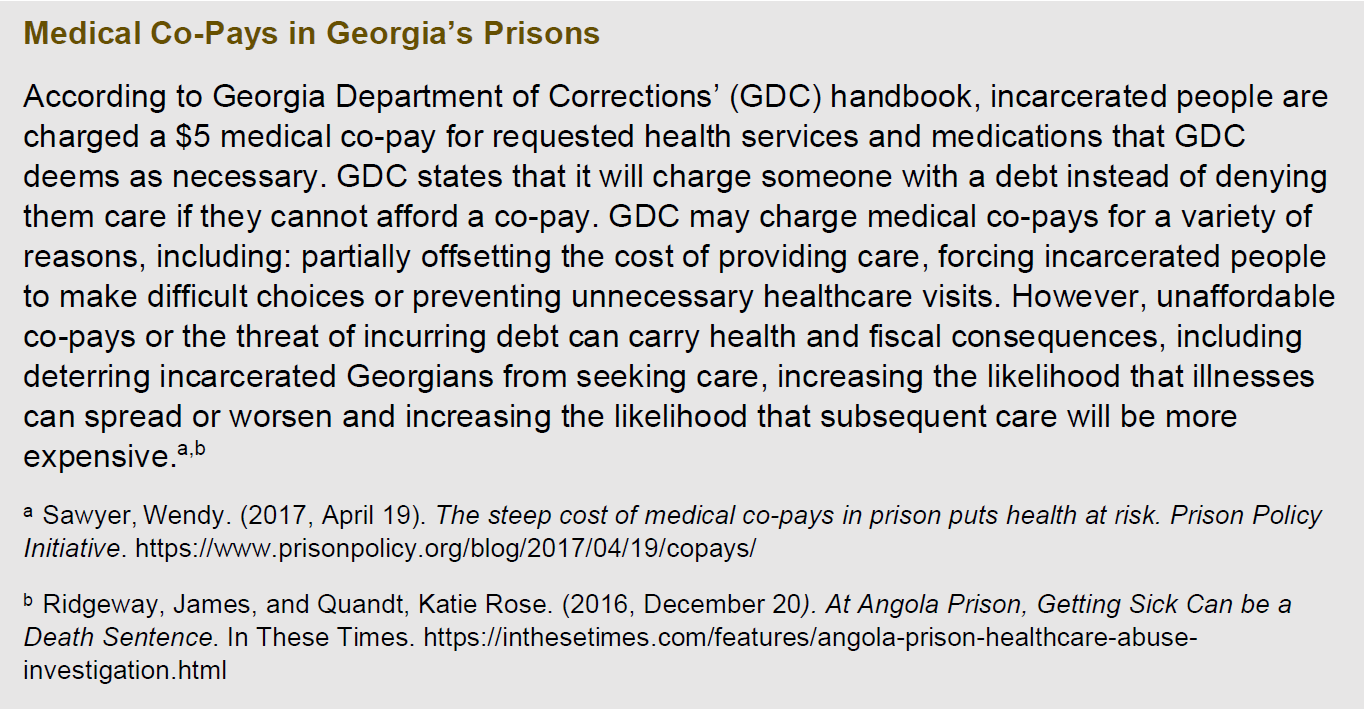For Fiscal Year (FY) 2026, Governor Brian Kemp proposed a $1.62 billion budget for the Georgia Department of Corrections (GDC), the agency overseeing Georgia’s prison system. This proposed budget is $125 million higher than what was approved for FY 2025. [1] This increase is attributed to investments in infrastructure and security improvements; increases in prison healthcare, technical and vocational education contracts to match rising prison population growth; GDC staff salary adjustments to compete with statewide pay averages in comparable jobs in other industries; and administrative changes.
These fiscal proposals mark a four-year trend in rising state prison spending, offering the latest response to prison violence concerns and legislative study committee recommendations. They address several acute safety and staffing issues, including a multi-year effort to create single-person cells, upgrade damaged or faulty locks across facilities, utilize added technology to combat the flow of prison contraband and increase bed capacity in private prisons. These are all included as supportive measures folded into public facility infrastructure projects.

By The Numbers
Amended 2025 Fiscal Year Budget
- $17 million increase to boost marketing, training and workforce retention efforts among corrections staff
- $280 million in additional funds to support new infrastructure projects, technology upgrades and security improvements
- $1.2 million increase to expand contracts for technical and vocational education programs and purchase related education equipment
- $66 million in additional funds to expand prison health contracts to include mental, dental, physical and pharmacy services for incarcerated Georgians
2026 Fiscal Year Budget
- $50 million increase to support new infrastructure projects, technology upgrades and security improvements
- $805,000 increase for additional contracts for technical and vocational education programs and purchase related education equipment
- $31 million increase to expand prison health contracts to include mental, dental, physical and pharmacy services for incarcerated Georgians
- $23 million in additional funds to provide salary increases and make job promotion system changes for eligible corrections staff
- $2.3 million in additional funds to provide administrative adjustments to increase investments in state employee retirement and insurance programs
Governor Kemp’s current proposals total roughly $500 million in added spending for AFY 2025 and FY 2026. Not including added spending from recent amended budgets, the proposed FY 2026 budget would reach annual spending levels that are nearly $500 million higher than FY 2022. If this is passed it would represent a 44% increase in prison spending from FY 2022 to FY 2026. While state lawmakers have sought to address Georgia’s carceral challenges through fiscal approaches that have spiked prison spending, these approaches have been largely void of actions that address the fiscal and prison health access burdens carried by incarcerated Georgians and their loved ones.
Many of those serving sentences in Georgia prisons are coerced to provide unpaid and unprotected labor which help subsidize millions in public and private profits,[2] while having to purchase prison health services and basic living necessities. Their civilian loved ones, who are not guilty of a crime, often face economic hardships while shouldering those costs, including prison phone and mail communication fees.[3]
Despite proposals to add nearly $100 million over AFY 2025 and FY 2026 to increase prison health contract spending to match a rising prison population, no fiscal proposals specifically address incarcerated Georgians’ ongoing prison health access challenges. Prison health co-pays maintain unaffordable barriers and add to or create debt for incarcerated Georgians to receive adequate and timely care, particularly for those with chronic health needs. Also, incarcerated Georgians continue to bear the previous commissary price increases on basic necessities like hygiene products, which paid for a nearly $5 million prison spending cut in FY 2021.[4]

Broader Budget Implications
Georgia’s accelerated pace of prison spending is in tandem with its accelerated pace of growth in criminal legal system policies that place more Georgians under carceral control and debt. This pace is also reinforced by over-policing and state and local dependence on fines and fees revenue streams tied to criminal legal system entanglement, which may grow if challenging economic periods cause other revenue streams to decline.[5] Without a change of course, our criminal legal system will undermine efforts toward holistic community health, economic security and workforce prosperity.
Endnotes
[1] GBPI analysis of Fiscal Year 2026 Governor’s Budget Report.
[2] McDowell, R., Mason, M. (2024, January 29). Prisoners in the U.S. are part of a hidden workforce linked to hundreds of popular food brands. AP News. https://apnews.com/article/prison-to-plate-inmate-labor-investigation-c6f0eb4747963283316e494eadf08c4e
[3] deVuono-powell, S., Schweidler, C., Walters, A., Zohrabi, A. (2015 September). Who pays? The true cost of incarceration on families. Ella Baker Center for Human Rights.
[4] S, Angel. (2020, February 5). Overview: Georgia’s 2021 fiscal year budget for Georgia Department of Corrections. Georgia Budget and Policy Institute. https://gbpi.org/overview-georgias-2021-fiscal-year-budget-for-department-of-corrections/
[5] Carpenter II, D., Lawson, C., Deuser, C. (2021). What the Great Recession revealed about taxation by citation and what can be done about it. University of Michigan Journal of Law Reform.









